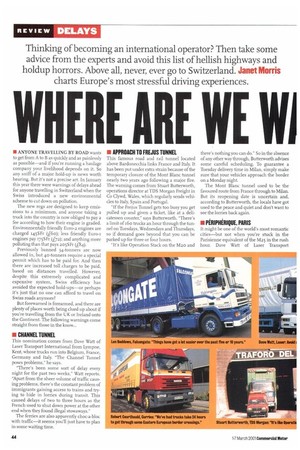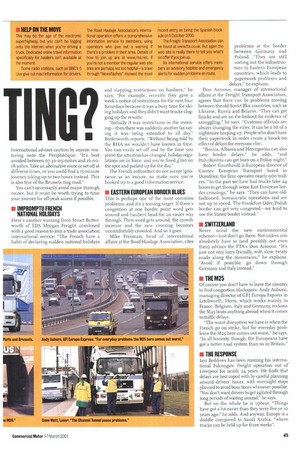vI EKE ARE VIE 1"11 Thinking of becoming an international
Page 46

Page 47

If you've noticed an error in this article please click here to report it so we can fix it.
operator? Then take some advice from the experts and avoid this list of hellish highways and holdup horrors. Above all, never, ever go to Switzerland. Janet Morris charts Europe's most stressful driving experiences.
• ANYONE TRAVELLING BY ROAD wants to get from A to B as quickly and as painlessly as possible—and if you're running a haulage company your livelihood depends on it. So any sniff of a major hold-up is news worth hearing. But it's not a precise art. In January this year there were warnings of delays ahead for anyone travelling in Switzerland when the Swiss introduced a new environmental scheme to cut down on pollution.
The new regs are designed to keep emissions to a minimum, and anyone taking a truck into the country is now obliged to pay a fee according to how their engine is graded. Environmentally friendly Euro-2 engines are charged 145SFr (160); less friendly Euro-1 engines pay f75SFr (172); and anything more polluting than that pays zos SFr (184).
Previously banned 34-tonners are now allowed in, but 4o-tonners require a special permit which has to be paid for. And then there are increased toll charges to be paid, based on distances travelled. However, despite this extremely complicated and expensive system, Swiss efficiency has avoided the expected hold-ups—or perhaps it's just that no one can afford to travel on Swiss roads anymore!
But forewarned is forearmed, and there are plenty of places worth being clued up about if you're travelling from the UK or Ireland onto the Continent. The following warnings come straight from those in the know...
• CHANNEL TUNNEL This nomination comes from Dave Watt of Laser Transport International from Lympne, Kent, whose trucks run into Belgium, France, Germany and Italy. "The Channel Tunnel poses problems," he says.
"There's been some sort of delay every night for the past two weeks," Watt reports. "Apart from the sheer volume of traffic causing problems, there's the constant problem of immigrants gaining access to trains and trying to hide in lorries during transit. This caused delays of two to three hours as the French used to shut down power at the other end when they found illegal stowaways."
The ferries are also apparently choc-a-bloc with traffic—it seems you'll just have to plan in some waiting time.
• APPROACH TO FREJUS TUNNEL
This famous road and rail tunnel located above Bardonecchia links France and Italy. It has been put under extra strain because of the temporary closure of the Mont Blanc tunnel nearly two years ago following a major fire. The warning comes from Stuart Butterworth, operations director at TDS Morgan Freight in Co Clywd, Wales, which regularly sends vehicles to Italy, Spain and Portugal.
"If the Frejus Tunnel gets too busy you get pulled up and given a ticket, like at a delicatessen counter," says Butterworth. "There's a limit of f6o trucks an hour through the tunnel on Tuesdays, Wednesdays and Thursdays, so if demand goes beyond that you can be parked up for three or four hours.
"It's like Operation Stack on the Mao and
there's nothing you can do." So in the absence of any other way through, Butterworth advises some careful scheduling. To guarantee a Tuesday delivery time in Milan, simply make sure that your vehicles approach the border on a Monday night.
The Mont Blanc tunnel used to be the favoured route from France through to Milan. But its reopening date is uncertain and, according to Butterworth, the locals have got used to the peace and quiet and don't want to see the lorries back again.
• PERIPHERIQUE. PARIS It might be one of the world's most romantic cities—but not when you're stuck in the Parisienne equivalent of the M25 in the rush hour. Dave Watt of Laser Transport
International advises caution by anyone venturing onto the Peripherique: "It's best avoided between o7.3o-o9:oohrs and 16.0018:3ohrs. Take an alternative route or set off at different times, or you could find a 15-minute journey taking up to two hours instead. This is also true of the Brussels ring road."
You can't necessarily avoid major through routes, but it must be worth trying to time your journey for off-peak access if possible.
• IMPROMPTU FRENCH NATIONAL HOLIDAYS Here's another warning from Stuart Butterworth of TDS Morgan Freight, combined with a good reason to join a trade association international service: "The French have a habit of declaring sudden national holidays
and slapping restrictions on hauliers," he says. "For example, recently they gave a week's notice of restrictions for the next four Saturdays because it was a busy time for skiing holidays and they didn't want trucks clogging up the resorts.
"Initially it was restrictions in the morning—then there was suddenly another fax saying it was being extended to all day," Butterworth reports. "Without being told by the RHA we wouldn't have known in time. You can easily set off and by the time you arrive the situation has changed, holiday regulations are in force, and you're fined Lroo on the spot and parked up for the day."
The French authorities do not accept ignorance as an excuse, so make sure you're hooked up to a good information service.
• EASTERN EUROPEAN BORDER BLUES This is perhaps one of the most common problems, and it's a moving target. If there's congestion at one border point word gets around and hauliers head for an easier way through. Then word gets around, the crowds increase and the new crossing becomes uncomfortably crowded. And so it goes.
Mike Freeman, head of international affairs at the Road Haulage Association, cites problems at the border between Germany and Poland. "They are still sorting out the infrastructure in Eastern European countries, which leads to paperwork problems and delays," he explains.
Don Armour, manager of international affairs at the Freight Transport Association, agrees that there can be problems moving between the old Soviet Bloc countries, such as Ukraine, Russia and Belarus. "They can get finicky and are on the lookout for evidence of smuggling," he says. "Customs officials are always changing the rules. It can be a bit of a nightmare keeping up. People who don't have their paperwork in order create a knock-on effect of delays for everyone else.
"Bosnia, Albania and Hercegovina can also have border delays," he adds, "and Italy/Austria can get busy on a Friday night."
Robert Courthauld is European director of Curries European Transport based in Dumfries; the firm operates nearly 900 trailers. "In the past we have had trucks take 24 hours to get through some East European border crossings," he says. "They can have oldfashioned, bureaucratic operations and are not up to speed. The Frankfurt Oder/Polish border can get very congested—we tend to use the Staten border instead."
• SWITZERLAND Never mind the new environmental scheme—just don't go there. Not unless you absolutely have to (and possibly not even then) advises the ETA's Don Armour. "It's just not very lorry friendly, with slow, twisty roads along the mountains," he explains. "Avoid if possible: go down through Germany and Italy instead."
• THE M25 Of course you don't have to leave the country to find congestion blackspots: Andy Auburn, managing director of G F I Europa Express in Letchworth, Herts, which works mainly in France, Belgium, Italy and Germany, reckons the M2,5 beats anything abroad when it comes to traffic delays.
"The worst disruption we have is when the French go on strike, but for everyday problems the M25 here comes out worst," he says. "In all honesty, though, the Europeans have got a better road system than us in Britain."
• THE RESPONSE Len Bed dows has been running his international Fakongate Freight operation out of Liverpool for nearly 24 years. He finds that delays are best coped with by careful planning around drivers' hours, with overnight stops planned to avoid busy times whenever possible. "You don't want drivers to get agitated through long periods of waiting around," he says.
But on the whole he is upbeat. "Things have got a lot easier than they were five or ro years ago," he adds. And anyway, Europe is a doddle compared to Saudi Arabia, "where trucks can be held up for three weeks".
































































































